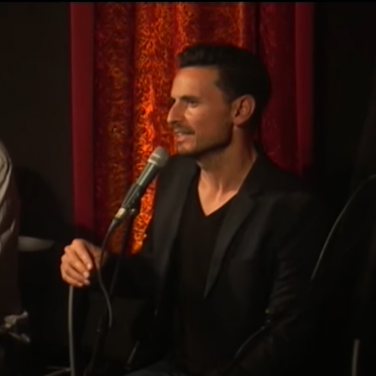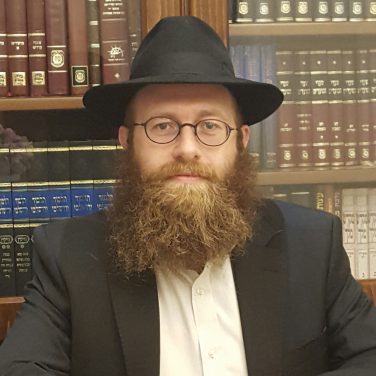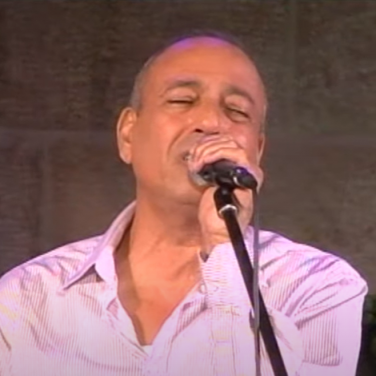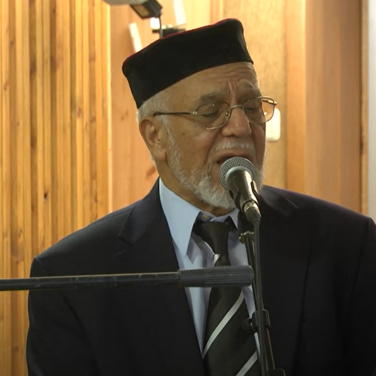Victoria Hanna – Orayta
Akiva Sygal
(Torah) Orayta
From the Zohar, Volume III, page 166b
Translation: Abraham Leader “Rabbi Shimon wept and opened and said: Torah, Torah, light of all worlds Source of every spring and sea, All wells and rivers from you flow, In all directions, above, below All come from you: Most high, most low. Torah, Torah How shall I describe you? a beloved doe a gracious roe above and below Torah, Torah Who of your lovers may suckle on you? Delights of your master, Who will reveal your well-hidden treasures?”
As a child, whenever Simchat Torah approached I would be filled with apprehension. I was used to going to the synagogue to pray – the ritual is fairly orderly, the cantor sings, the others join in or mumble from their seats, and no strenuous activity is required of you. And suddenly, for one day a year, the anomaly erupts: all the synagogue benches are moved aside, the tiles underneath are exposed and become an improvised dance floor in the middle of the synagogue, and you are suddenly expected to dance. To dance, in front of all the elders of the synagogue? What on earth, this is a place for prayer! And dancing is a pretty embarrassing thing: you are never sure what you look like and whether your movements are not actually clumsy and ridiculous. So suddenly all the men (and all the women, from above!) will see you moving foolishly, just as you are, in front of everyone? The Bible describes how David pranced and capered in front of the Ark of the Covenant, and how Shaul’s daughter Michal mocked him for it. And each of us on Simchat Torah fears that there will be some Michal to mock us and undermine our self-confidence. David, of course, answered her without hesitation – but David was a great warrior that everyone admired, and you are just a small child fearful of your own body. Since when have we been taught that the way to rejoice in the Torah is to dance around it? Usually love for the Torah is expressed in learning; let them give a special Torah lesson, you will have no problem joining in – but suddenly you are not being asked to open the book or understand what is written in it, but simply to dance around it in a kind of strange ceremony that looks so different from what you are used to in the synagogue. That’s why I admire Victoria Hanna. Because when you see Victoria Hanna perform, you see the girl dancing her strange dance in front of everyone, and she simply does not care what they say about her, and who laughs at the weird thing she does. She is not exactly a singer, she is sometimes defined as a ‘sound artist’ – she has never supported this definition. What is clear is that she is doing her art, and is absolutely not trying to fit into any familiar pattern of making music. This girl from an ultra-Orthodox home, where a woman is not allowed to sing, opened her mouth in her own special way and suddenly found herself performing all over the world, even in India before the Dalai Lama, while in Israel her name is still known only to a few. And then she burst into our awareness in 2015 with the song (and clip) “Alphabet”, which is based entirely on the traditional text of the “Hoshanot” prayer. Suddenly we hear “Hosha Na” being hummed everywhere, and the letters of the alphabet used one after the other with her distinctive pronunciation. But Hanna is not satisfied with this, she leaves even the texts from the Siddur, which are familiar at least to synagogue attendees, and moves on to more and more esoteric Kabbalistic texts, setting to music, if you can call it that, passages from the fundamental books of the Kabbalah – the Zohar and Sefer Yetzirah (the Book of Creation). The Zohar is attributed to Rabbi Shimon Bar Yochai, who secluded himself in a cave for 13 years and revealed the mysteries of the Torah. The book is written in Aramaic, and Hanna does not translate the words but sings the text as it is, in the unintelligible source language; she wants to keep the melody of the words, their tone, the secret. And that is exactly the point – when you bring texts of the Kabbalah to the world of pop music, you have to preserve the element of secrecy in them, so that it is not lost and the mysteries of the Torah diminished. Hanna preserves this by keeping the Aramaic, and through the presentation and atmosphere that holds something back. Nir Menussi once wrote, about another song: “… In this context the less-known Aramaic word for the Torah, ’Orayta’, stands as a kind of shield-mask that simultaneously separates and brings closer … This is reminiscent of the veil with which Moses covered his face as he descended from Mount Sinai when the second Tablets were given, in order to conceal the light that shone from his face, lest it dazzle and darken the eyes of the children of Israel… The word ‘Orayta’, even though it is in Aramaic, includes the Hebrew word light – it seems to focus and highlight the light in the Torah, that is hidden in its original name.” And indeed, the text of ‘Orayta’ deals with wonder at the Torah, how deep, broad and illuminating it is; however, it is interesting that it opens with the words, “Rabbi Shimon wept and lamented”. The reference, of course, is to Rabbi Shimon Bar-Yochai, the author of the Zohar – he, too, when exposed to the secrets of the Torah in the most intimate way, cannot refrain from weeping in the face of its infinite power and richness. He addresses the Torah, the ‘Orayta’, in the second person: “All is from you, upon you stand the upper and lower firmaments…” “The amusements of your authority, who can discover and say your secrets and your treasures?” In the face of the true, infinite power of the Torah, even Rabbi Shimon Bar-Yochai is as nothing. If the Torah is infinite, there is no difference between one who has studied a little of it and one who knows a lot – everyone is equal in the face of its infinity. And that is the meaning of this Aramaic text, which as Menussi writes, speaks of this ‘Orayta’ that fills the whole world with its greatness, and not of the specific “Torah” that each of us has either learned or not learned, for love or not. At Simchat Torah we try to rejoice in the Torah itself. Not in part of it, not in the affair from it, not in its ending or beginning. And the Torah itself is greater than any Torah lesson, and any reading of the Torah – the Torah itself, in its true depth that fills the whole world, is so inaccessible that the rabbi and the pupil are equal in it. Therefore on Simchat Torah the Torah scroll remains closed and sealed, and we dance around it and rejoice in its very existence, without opening it and trying to learn specific content from it, which will diminish it. One can imagine the Torah scroll as a kind of Schrödinger’s cat – so long as the Torah is closed inside its case, the whole world can be hidden within it, all the mysteries of the universe. Once it is opened and a particular parsha is read, the Torah becomes the specific parchment with the its letters and words. So Hanna simply presents the text on the Torah in Aramaic, as it is, in a catchy rhythm, and invites me to dance to the sounds of those words, to listen to their inner rhythm and let it move the body, without trying to translate and understand.







